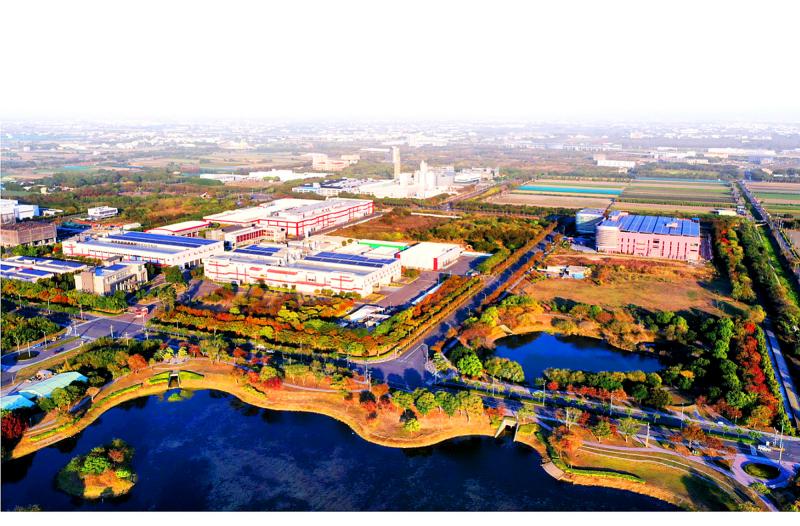Chip testing and packaging company Siliconware Precision Industries Co (SPIL, 矽品精密) plans to invest NT$97.5 billion (US$3.26 billion) to build a new plant in Yunlin County’s Huwei Township (虎尾), creating a new semiconductor hub in the agricultural county, the Central Taiwan Science Park (CTSP, 中部科學園區) said yesterday.
The plant would generate NT$35.4 billion in annual revenue once it is fully utilized, the science park said in a statement.
The facility, which is to cover 14.5 hectares, would create 2,800 jobs in the county, it said.

Photo courtesy of the Administration of Central Taiwan Science Park
“The latest project shows SPIL’s commitment to invest in Taiwan and demonstrates its determination to keep crucial manufacturing technology in the country,” SPIL chief administrative officer Chien Kun-yi (簡坤義) said after meeting with Yunlin County Commissioner Chang Li-shan (張麗善).
SPIL has been scouting potential locations for a plant in central Taiwan and finalized the location yesterday, Chien said.
Construction would start in the fourth quarter of this year, the company said, adding that first-phase operations are scheduled to begin in 2024.
The announcement came as SPIL’s parent company, ASE Technology Holding Co (日月光投控), proceeds with a capacity expansion to keep up with rising demand.
ASE on Friday broke ground on a NT$30 billion expansion of its facilities in Taoyuan’s Jhongli District (中壢).
The new facility is expected to start operations in the third quarter of 2024, it said.
It would contribute US$60 million in production value, ASE said in a separate statement, adding that it would create 2,000 jobs.
The new facilities would produce advanced IC packaging and testing technologies, such as wire bonding, flip-chip packaging and wafer-level packaging, ASE said.
ASE in April told investors that revenue growth this year would be supported by strong demand for high-performance computing, networking and automotive devices.
That would offset weakness in smartphone and consumer electronics segments, it said.
Chen Tien-ssu (陳天賜), president of ASE’s Jhongli plant, on Friday said that the existing facilities, which employ about 12,000 people, are operating at full capacity amid solid demand for high-performance computing, automotive electronics, 5G and Internet of Things devices.
Despite industry reports of scaled-backed orders and rising inventories, Chen said he expects the plant to continue operating at full capacity through the end of this year.
Additional reporting by CNA

China’s Huawei Technologies Co (華為) plans to start mass-producing its most advanced artificial intelligence (AI) chip in the first quarter of next year, even as it struggles to make enough chips due to US restrictions, two people familiar with the matter said. The telecoms conglomerate has sent samples of the Ascend 910C — its newest chip, meant to rival those made by US chipmaker Nvidia Corp — to some technology firms and started taking orders, the sources told Reuters. The 910C is being made by top Chinese contract chipmaker Semiconductor Manufacturing International Corp (SMIC, 中芯) on its N+2 process, but a lack

NVIDIA PLATFORM: Hon Hai’s Mexican facility is to begin production early next year and a Taiwan site is to enter production next month, Nvidia wrote on its blog Hon Hai Precision Industry Co (鴻海精密), the world’s biggest electronics manufacturer, yesterday said it is expanding production capacity of artificial intelligence (AI) servers based on Nvidia Corp’s Blackwell chips in Taiwan, the US and Mexico to cope with rising demand. Hon Hai’s new AI-enabled factories are to use Nvidia’s Omnivores platform to create 3D digital twins to plan and simulate automated production lines at a factory in Hsinchu, the company said in a statement. Nvidia’s Omnivores platform is for developing industrial AI simulation applications and helps bring facilities online faster. Hon Hai’s Mexican facility is to begin production early next year and the

AVIATION BOOM: CAL is to renew its passenger and cargo fleets starting next year on record profits as aviation continues to return to pre-pandemic levels China Airlines Ltd (CAL, 中華航空) yesterday said it is optimistic about next year’s business outlook, as the airline continues to renew its fleet on expectations that global passenger traffic would maintain steady growth and air cargo demand would remain strong. From next year to 2028, the airline is to welcome a new Boeing Co 787 fleet — 18 787-9 and six 787-10 passenger aircraft — to cover regional and medium to long-haul destinations, CAL chairman Hsieh Shih-chien (謝世謙) said at an investors’ conference in Taipei. The airline would also continue to introduce Airbus SE 321neo passenger planes and Boeing 777F cargo jets,

Who would not want a social media audience that grows without new content? During the three years she paused production of her short do-it-yourself (DIY) farmer’s lifestyle videos, Chinese vlogger Li Ziqi (李子柒), 34, has seen her YouTube subscribers increase to 20.2 million from about 14 million. While YouTube is banned in China, her fan base there — although not the size of YouTube’s MrBeast, who has 330 million subscribers — is close to 100 million across the country’s social media platforms Douyin (抖音), Sina Weibo (新浪微博) and Xiaohongshu (小紅書). When Li finally released new videos last week — ending what has